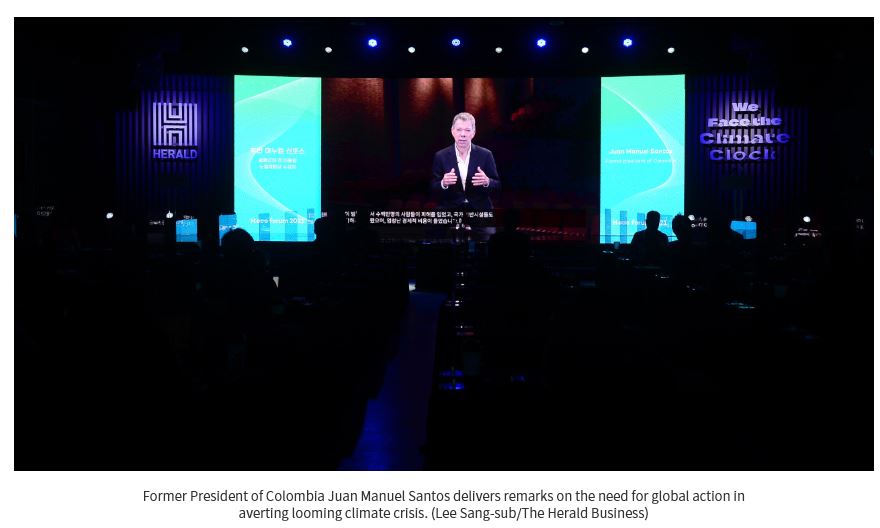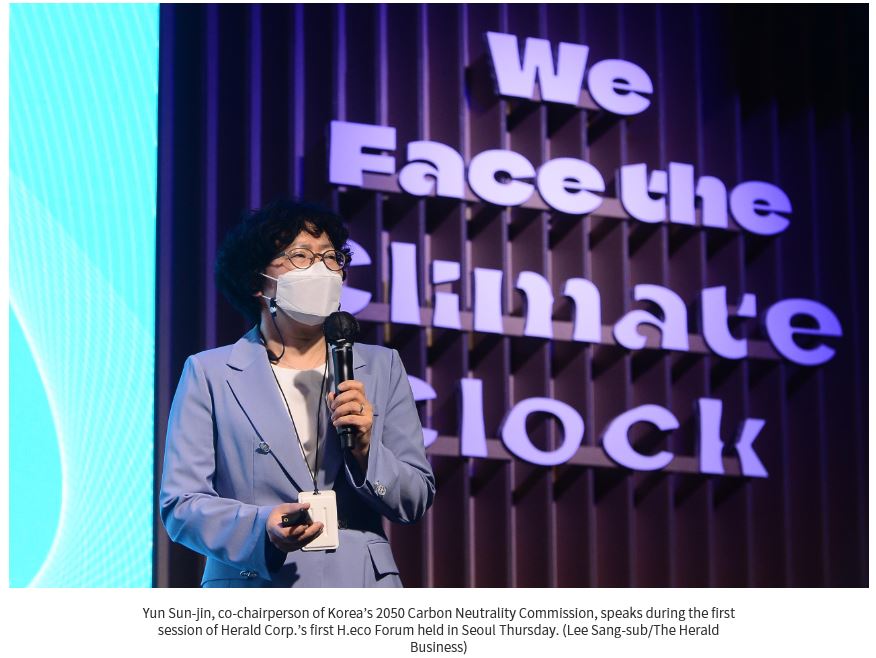
Transnational cooperation is key to finding solutions to avert a climate catastrophe and creating a sustainable future, global leaders stressed Thursday.
During the first session of Herald Corp.’s first H.eco Forum in Seoul, three international figures from South Korea, Colombia and the UK gave remarks on the importance of government policies, international cooperation and political leadership in tackling climate change.
Opening the session, Yun Sun-jin, co-chairperson of Korea’s 2050 Carbon Neutrality Commission, emphasized that the international community’s commitment to carbon neutrality was an unavoidable task, highlighting how South Korea could contribute to the time-sensitive challenge as a leading nation.
The commission was launched last month to follow up on President Moon Jae-in’s vow to accelerate the reduction of its reliance on fossil fuels and nurture eco-friendly sectors to construct a low-carbon economic structure and eventually achieve carbon neutrality by 2050.
The top carbon neutrality strategist said the Korean New Deal strategy was a means for Asia’s fourth-largest economy to shift toward sustainable economic growth and achieve carbon neutrality in line with the global trend.
“South Korea is a country that assumes a big responsibility in terms of climate threat, and we are pressured to take action toward carbon neutrality,” Yun said. “Our country’s economy is based on a highly energy-dependent manufacturing sector, and we should be on top of responding to changes in the global market.”
Yun said carbon neutrality has become an urgent goal for everyone around the world as humanity faces risks from continuing to rely on carbon-based civilization. It is not feasible to maintain the energy structure or infrastructure of the past while facing a climate crisis, she added.

“Social consensus is critical in carrying out this agenda,” she added. “This goal of carbon neutrality cannot be achieved with efforts of some. We all have to strive towards this goal, and discussions should be raised on who is going to pay how much in which manner to reduce carbon emissions levels.”
Former President Juan Manuel Santos of Colombia, winner of the Nobel Peace Prize in 2016, followed Yun’s address and stressed that climate change and its potential effects are the most threatening challenges posed by humanity, asking for international joint efforts to tackle the problem.
“Unfortunately, humanity and nature are more disconnected than ever before,” Santos said, ahead of introducing Colombia’s efforts to protect the environment during his term from 2010 to 2018.
“The destruction of our biodiversity and the dangerous decline of nature’s contribution to people around the world, along with the existential threat posed by climate change, are the most important challenges of this and every future generation.”
Santos directed the establishment of the Ministry of Environment and Sustainable Development and promoted bold environmental policies. His administration introduced the first carbon tax in South America, imposed a consumption tax on plastic bags and made efforts to conserve Colombia’s natural ecosystems.
But Santos stressed that much more is needed to truly tackle the environmental issue, as only a small window of time is left to prevent the climate crisis from becoming a reality. International cooperation is in dire need to achieve a green recovery and promote coexistence between humanity and nature.
“We should never forget these threats can only be addressed through global action,” he added.
“Unfortunately, too many countries still think in delusion that they can survive in isolation, that their borders can somehow magically protect them while the rest of the planet burns.”
He emphasized that governments should work without borders and collaborate as an “environmental army to fight climate change” and protect the planet as a united species.

Following the presentation from Santos, John Murton, the UK government’s envoy for the 26th round of vital UN climate talks, called COP26, discussed his country’s efforts to persuade other nations to strengthen their carbon-neutrality goals ahead of the COP26 in November.
The years leading up to 2030 will be the most decisive for delivering on the Paris Agreement, Murton said, stressing that COP26 must serve as a moment for climate action “where the international community turns words and promises into action.”
As the COP26 host country, the UK is pressing for action around mitigation, adaptation, finance and collaboration, Murton said, which will be critical in effectively addressing the issue of climate change as a united international community.
In explaining the four areas, Murton said the international community must be willing to mitigate climate change by making bolder commitments while working to adapt to changes by protecting humans and nature at the same time.
The public and private finance sectors should be geared toward providing investment or developing infrastructure for a greener economy, he added, while the global community negotiates the rules needed to go net zero and step closer to the implementation of the Paris Agreement.
“COVID-19 has demonstrated importance of following science and of international collaboration, and has shown us that prevention is less costly than cure,” Murton said.
“Many of the solutions and technologies to the climate change problem already exist, and we can decarbonize economies and enable green recovery from COVID-19 using existing technologies.”
By Ko Jun-tae (ko.juntae@heraldcorp.com)
http://www.koreaherald.com/view.php?ud=20210610000755&np=1&mp=1